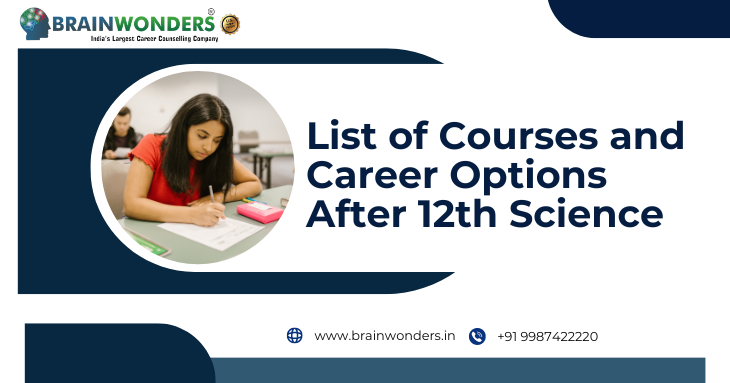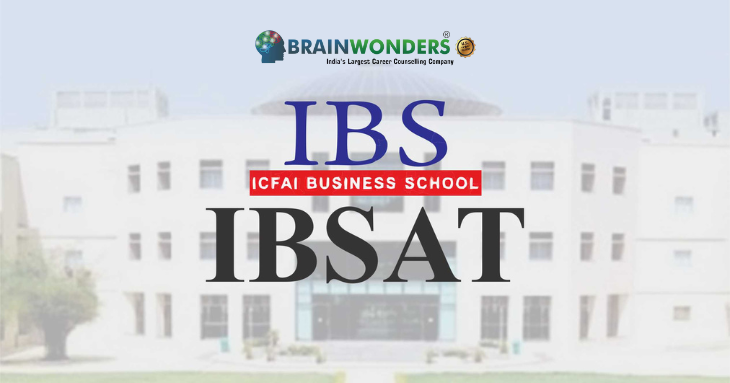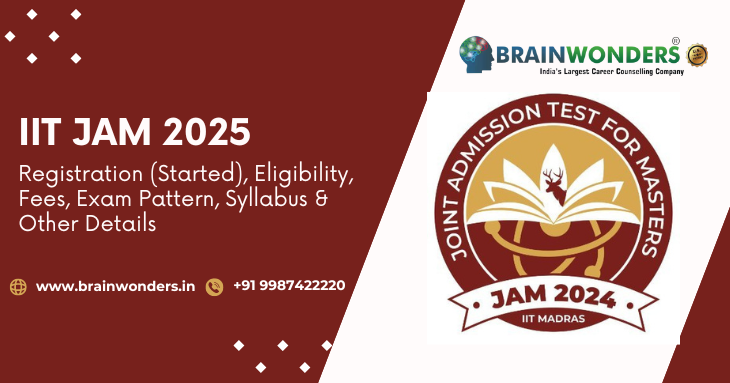

Take Brainwonders Career Test and make the right decisions for your college and course ahead
Let your unique personality, strengths, and traits guide to make the best decdision of your life!
Blog
26 April,2024 | By Brainwonders
.webp)
Do you harbour the ambition of securing a coveted seat at an IIT? Or are you seeking a definitive roadmap to crack the IIT entrance? The desire to gain admission into the Indian Institute of Technology (IIT) is a shared dream among countless Indians. These prestigious institutions have transcended the realm of mere educational establishments, becoming an embodiment of aspiration and prestige.
Ranked among the global elite, IITs are recognized by the Parliament of India as Institutes of National Importance. Their illustrious alumni, including luminaries like Sundar Pichai (CEO of Google and Alphabet Inc.), N.R. Narayana Murthy (Co-founder of Infosys), Raghuram Rajan (Ex-Governor of RBI), and Arvind Kejriwal (Chief Minister of Delhi), have cemented the IITs' reputation as the most prestigious engineering institutions in the country.
Given the immense allure and prestige associated with IITs, it is no wonder that Indian students are captivated by the prospect of securing a seat in these esteemed institutions. In response to this widespread aspiration, we have curated an A-Z Guide on "How to Get into IIT?" to provide aspiring students like you with the comprehensive insights and strategies needed to navigate the path to IIT admission.
The IIT JEE, or the Joint Entrance Examination, is the pivotal gateway for those aspiring to pursue architecture and engineering courses at the prestigious Indian Institutes of Technology (IITs). For students seeking admission to IITs after the 12th grade, clearing the IIT JEE exam is the established route to secure a coveted seat.
Upon successfully cracking the IIT JEE, students are granted admission to the IITs, the National Institutes of Technology (NITs), and various other renowned engineering colleges across India. This opportunity presents a remarkable prospect for all those who harbour ambitions in engineering and architecture.
The IIT JEE examination process comprises three main phases: IIT JEE Main, IIT JEE Advanced, and the IIT JEE Architecture test. Let's delve into the details of each of these crucial components.
The IIT JEE Main exam is the first crucial step towards securing admission to the Indian Institutes of Technology (IITs). In the present day, this examination is conducted by the National Testing Agency (NTA) in an online format, utilizing a secure local network rather than the Internet. Clearing the JEE Main exam is an essential prerequisite for those aspiring to enter the IITs after the 12th grade.
After successfully qualifying for the JEE Main exam, the next stage is the IIT JEE Advanced exam. This advanced level of the IIT entrance test is widely regarded as the most challenging, and it is also conducted online. Students must clear the IIT JEE Advanced examination to complete the entire IIT admission process.
This exam is specifically designed for students who wish to pursue a career in the field of architecture. Upon qualifying for this exam, candidates become eligible to enrol in architecture-related courses at the IITs. If a student has already cleared the JEE Main and Advanced exams, they can then appear for the AAT (Architecture Aptitude Test) exam. It is important to note that architecture courses are currently offered at only two IITs: IIT Kharagpur and IIT Roorkee.
Securing admission to the IITs after the 12th grade is a highly coveted goal for engineering aspirants. Graduates from these prestigious institutions often command lucrative job opportunities and high-paying packages from top multinational corporations. This is why parents are eager for their children to gain entry into the IITs. If you, too, are seeking to understand the path to IIT admission after the 12th, this comprehensive guide will provide you with the necessary insights.
Studying at the Indian Institute of Technology (IIT) offers numerous advantages, such as:
Life at the Indian Institute of Technology (IIT) is a truly distinctive and challenging journey, blending rigorous academic pursuits with a vibrant campus culture. Students are exposed to a demanding curriculum that delves into the latest advancements in engineering, technology, and related disciplines. Beyond the classroom, students have the opportunity to engage in a plethora of extracurricular activities, ranging from clubs and sports teams to student-run organizations and cultural events.
The IIT campus is a lively and dynamic community, home to a diverse student body hailing from all corners of India and around the world. This rich cultural and intellectual environment provides ample opportunities for personal growth and self-discovery. In addition to their academic studies, students have access to state-of-the-art facilities and resources, including comprehensive libraries, cutting-edge laboratories, and top-notch recreational amenities. The IIT experience is a transformative one, challenging students to push the boundaries of their knowledge and capabilities while fostering a sense of camaraderie and community. Through this multifaceted journey, IIT students not only acquire technical expertise but also develop essential life skills, preparing them to become leaders and innovators in their respective fields.
Selecting the right branch at the Indian Institute of Technology (IIT) can be a challenging decision. Still, with the right approach and careful consideration, you can make an informed choice that aligns with your interests, goals, and strengths. Here are the steps to guide you through this essential process:
Begin by reflecting on your interests and academic strengths. Consider your past experiences, including your educational background, extracurricular activities, and any relevant work or volunteering opportunities. This self-assessment will help you identify the areas that genuinely captivate you and where you excel.
Thoroughly explore the curriculum, research opportunities, and career prospects for each branch offered at the IIT you're considering. Understand what you'll be studying in each specialization and how it resonates with your interests and aspirations.
Envision your desired career path after graduation and evaluate how the different IIT branches align with your long-term goals. Analyze the job market and the types of careers available for graduates of each branch.
Reach out to current students or alums of the IIT you're interested in and seek their firsthand experiences and perspectives on the various branches. Their insights can be invaluable in helping you make an informed decision.
Ultimately, it's crucial to choose a branch that excites you and that you believe will help you achieve your goals. If you have any doubts, feel free to consult with academic advisors or counsellors who can provide additional guidance.
By following these steps, you can navigate the choice of the IIT branch with confidence, ensuring that your decision aligns with your passions, strengths, and future aspirations.
Let's discuss the criteria for the JEE (Main) and JEE (Advanced) examinations separately to better understand the eligibility requirements.
You will be eligible to appear for the JEE (Main) examination if you have either:
For example, if you wish to appear for the JEE (Main) 2021, you must have passed the 12th or equivalent examination either in 2019 or 2020. Alternatively, you are also eligible if you are going to appear for the 12th or equivalent examination in 2021.
The minimum eligibility criteria for the JEE (Advanced) examination are:
You are also eligible to appear for the JEE (Advanced) examination if you are appearing for the 12th or equivalent examination from a recognized Board of Education in the same year in which the JEE (Advanced) is being conducted. However, in this case, your eligibility will be provisional, and you will have to fulfil the above criteria of 75% marks in aggregate or being among the top 20 percentile before admission.
This information is crucial for those aspiring to secure a coveted seat at the Indian Institutes of Technology (IITs).
The Architecture Aptitude Test is exclusively available for candidates who have successfully passed the JEE (Advanced) examination.
| Step1 | Appear for the JEE (Main) Examination |
| Step2 | Appear for the JEE (Advanced) Examination |
| Step3 | Obtain All India Rank (AIR) |
| Step4 | Allocating of seats at the different IITs through a common process by the Joint seat Allocating Authority (JoSAA) |
To get admission into IIT you need to consider the following steps –
JEE Mains is a national-level entrance examination that serves as the gateway to securing admission in the Indian Institutes of Technology (IITs). To be eligible, a student must have passed the 12th grade with a minimum of 75% marks, with Physics, Chemistry, and Mathematics as the core subjects. The exam is computer-based, comprising 90 questions, of which the student must attempt at least 75.JEE Mains is conducted four times a year, and the best score out of the four attempts is considered for the next level of exams. It's important to note that a student can appear for JEE Mains within three years of passing the 12th grade.If the student is aiming for engineering courses, they will have to take only one PCM-based computer-based test. However, for architecture, they will need to appear for three papers, two of which are online, and one is an offline test to assess their drawing skills.Once a student clears the minimum cutoff criteria for JEE Mains, they become eligible to proceed to the next step.
JEE Advanced is a computer-based test conducted by the IIT Zonal Coordinators and regulated by the Joint Admissions Committee. Here, the student has to take two papers based on PCM, with a duration of 3 hours. A student can attempt JEE Advanced only twice.JEE Advanced assesses a student's ability, aptitude, and intelligence in their core subjects, with an increased level of difficulty. Students wishing to pursue architecture must also pass an additional pen-and-paper test known as the Architecture Aptitude Test (AAT).The goal at this stage is to secure the coveted All India Rank (AIR), which is the next step.
To be ranked, a student must meet certain criteria, including securing a minimum of 10% individually in Physics, Chemistry, and Mathematics, and an aggregate of 35% marks in all three subjects. Only those who fulfill this criterion are considered for the ranking.
The final step is the IIT seat allotment process, which is carried out by the Joint Seat Allocation Authority (JoSAA). This process applies to all IIT institutes, and candidates who have cleared JEE Mains and JEE Advanced can participate in the seat allotment process.Securing a seat in an IIT is a long and challenging journey, and students aspiring to become "IITians" should start their preparation well in advance to achieve the best results.
To secure admission to the prestigious Indian Institutes of Technology (IITs), you must satisfy at least one of the following two criteria after your Class 12th Board results are announced:
The marks scored in the following 5 subjects will be considered for calculating both the Class 12th aggregate marks as well as the cut-off marks of the top 20 percentile:
These are the key eligibility criteria that you must fulfill to be considered for admission to the prestigious IIT colleges after your 12th class.
The syllabus for entrance exams at the Indian Institute of Technology (IIT) varies depending on the specific exam, but typically includes mathematics, physics, and chemistry. Here's a general overview of the syllabus for the Joint Entrance Examination (JEE) Main, one of the exams used for IIT admissions:
Note: The syllabus and topics covered may vary annually, so it's advisable to consult the official exam website or the IITs you're interested in for the most current information. Additionally, preparation for these exams necessitates a solid understanding of each subject and a thorough grasp of the syllabus content.
One of the most common concerns among students revolves around how to excel in the IIT JEE Main Exam or effectively tackle the IIT JEE Advanced Exam. If you're grappling with these questions, fret not! We're here to lend a hand.
Here are some strategies you can employ to prepare for these exams:
Start Early: Commence your preparation as soon as possible, ideally a year or more in advance. This allows ample time to cover the entire syllabus thoroughly and establish a robust understanding of each subject.
Study the Syllabus: Familiarize yourself with the exam syllabus and format, and devise a study plan encompassing all topics in sufficient depth.
Acquire the Right Study Materials: Utilize high-quality study resources like textbooks, lecture notes, and sample papers. Additionally, consider enrolling in coaching classes or online courses for added guidance and support.
Practice, Practice, Practice: Consistent practice is paramount for success in these exams. Solve numerous practice questions and sample papers to enhance your speed, accuracy, and confidence.
Address Weaknesses: Identify your areas of weakness and concentrate on strengthening them. Seek assistance from teachers, mentors, or online platforms as necessary.
Manage Time Effectively: Efficient time management is crucial, given the need to balance studies with other commitments. Allocate dedicated study time daily and adhere to a consistent schedule.
Stay Motivated: Maintain your motivation and focus on your objectives. Surround yourself with positivity and reward yourself for your diligence and accomplishments along the journey.
These tips and tricks are invaluable for navigating the path to securing admission into IIT after completing the 12th grade.
In conclusion, we emphasize that there's no guaranteed formula for gaining admission to an IIT. Some students devote just 3-4 hours daily to studies and successfully secure a spot in IITs, while others labor for 8-10 hours without achieving the same outcome. A solid grasp of fundamental concepts in Science and Mathematics is crucial, but it's not the sole determinant. The depth of your analytical and logical skills is equally vital.
Before embarking on the journey of how to get into IIT, it's imperative to assess whether you should embark on this path at all. Seeking career counseling is essential before taking the first step. Consult with teachers who understand your strengths and weaknesses, as well as competent and impartial career advisors. Make an informed and rational decision, as diving into the endeavor without adequate preparation is akin to swimming in unknown waters.
That concludes our discussion for today. We look forward to reconnecting with you soon. Thank you, and best of luck!
IIT institutes are known for their infrastructure, electronic libraries, innovative tech festivals, and highly passionate and resourceful teaching faculty. The first IIT institute at Kharagpur was inaugurated in 1950, while the latest ones at Goa Bhilai, Dharwad and Jammu were established in 2016. So if you are thinking of shortlisting the best colleges for engineering, IIT should top the list.
Quality Education: IITs are known for providing high-quality education in engineering, science, and many other fields. Their rigorous academic programs and world-class faculty ensure that students get a good start in their chosen areas.
Technical Skills: Students who finish IITs have excellent technical skills and the ability to solve problems. These graduates become skilled professionals who work in a wide range of businesses and sectors and help move technology forward.
Study and Innovation: IITs are at the forefront of study and new ideas. They make big contributions to scientific, engineering, and technological progress by doing cutting-edge studies in many fields. This encourages new ideas and pushes the limits of what we know.
IITs are known worldwide for how well they teach, how much study they do, and how good their graduates are. This recognition brings India into partnerships with leading schools worldwide and improves India's reputation worldwide.
Entrepreneurship: IITs are key in encouraging people to start their businesses. IIT campuses have been home to many successful startups, which shows how the colleges help promote innovation and support aspiring entrepreneurs.
Contribution to Society: Graduates of IITs work in education, business, government, and non-profit organizations, among other places. These people work to solve important problems and make the world a better place.
Infrastructure and Facilities: IITs have state-of-the-art buildings, labs, libraries, and other facilities that help with academic and study work. This setting helps people learn and get better at everything.
Opportunities for jobs: Employers want IIT graduates because they have great technical skills and can solve problems. This opens up a lot of job possibilities both in the United States and around the world.
Effects on Education: IITs set high academic standards that affect India's education system. Their success inspires other schools to try harder, raising the bar for education nationwide.
National Development: IITs add to national development by creating a skilled workforce that drives economic growth, innovation, and technological advances. Their graduates work in infrastructure, healthcare, transportation, and other important fields.
| Careers | Average Salary |
| Computer Programmer | ₹17,000-83,000 |
| Data Scientist/Data Analyst | ₹25,000-48,000 |
| Software Developer, Applications | ₹30,000-60,000 |
| Web Developer | ₹12,000-50,000 |
| Leader | ₹17,000-41,000 |
| Personal Financial Advisor | ₹20,000-37,000 |
JEE mains is a national Entrance test that forms the basis for admission to IIT. A student has to pass 12th with a minimum of 75% marks with Physics, Chemistry and Mathematics as his core subjects. It is a Computer-based Test with 90 questions. Out of this, a student has to attempt 75 questions.
JEE Mains is conducted 4 times a year. So the best score out of your 4 attempts will be considered for the next level of exams. Remember, you can appear for JEE for 3 years after passing 12th.
If you are aiming for admission in the engineering courses, you will have to give only one Computer-based Test based on PCM, but if you are aiming for architecture, you have to appear for 3 papers. Two of them are online, and one is an offline test to evaluate your drawing skills.
Once you clear the JEE Mains with the minimum cutoff criteria, you are eligible for Step 2.
The cutoff varies every year depending on the number of students appearing and the difficulty level. After attaining the minimum cutoff in JEE Mains, prepare for Step 2
JEE Advanced is again a computer-based test conducted by the zonal coordinators of IIT. The Joint Admission Board further regulates it. Here, the student has to take up 2 papers based on PCM. It is a 3-hour test, and a student can attempt it only twice. JEE Advanced assesses the student's ability, aptitude, and intelligence concerning his core subjects with an increased difficulty level. Students aspiring to Join architecture have to appear for an additional pen and paper test known as the Architecture Aptitude Test (AAT).
Here the AIM is to get a hold of the ALL INDIA RANK, which is precise step 3.
To obtain a rank here, a student has to fulfil specific criteria. He has scored a minimum of 10% individually in Physics, Chemistry and Mathematics, and he has to get an aggregate of 35% marks in all 3 subjects. Only if the student fulfils, this criterion is considered for the ranking.
To obtain a seat in the IIT, one must go through a standard seat allocation process. This process is carried out by the Joint Seat Allocation Authority (JoSAA). This process applies to all the IIT institutes.
So after clearing JEE mains and JEE advanced, one finds his way to obtaining the AIR score and captures a seat at IIT. It is a long way, and a student aspiring to become an IITian has to start well in advance for better results.
Q.1) What is the most effective way to prepare for the IIT-JEE entrance exam?
Ans: One of the most important steps in preparing for the IIT-JEE is to set realistic goals and create a study plan. Developing a regular study schedule that fits with your other commitments should be a priority. Additionally, it's important to review past papers and practise mock exams regularly to get familiar with the types of questions asked and the test format. It is also beneficial to develop good note-taking habits and keep detailed notes on topics that you find difficult or need more clarification on. Finally, seeking professional guidance from experienced tutors or mentors is highly recommended to help ensure that you are adequately prepared for the exam.
Q.2) What are the main topics one should cover while preparing for the IIT-JEE entrance exam?
Ans: Preparation for the IIT-JEE entrance exam requires candidates to have familiarity with a variety of topics. Specifically, it is important that candidates understand concepts in Physics, Chemistry and Mathematics, including Algebra, Geometry and Trigonometry, as well as Calculus. Additionally, candidates should have a basic knowledge of Reasoning and Logical Thinking, and be able to apply these skills when tackling various problem types. It is also recommended that candidates familiarise themselves with current events and some basic computer programming techniques. Finally, having an understanding of graph theory and probability can help candidates understand more complex problems. By studying each of these topics, candidates can give themselves a comprehensive foundation on which to build their success in the IIT-JEE entrance exam.
Q.3) What other factors are involved in Clearing the toughest exams?
Ans: Clearing the toughest exams requires more than just knowledge and hard work. It is essential to have a holistic approach to exam preparation, from understanding the syllabus to building effective study habits. A good strategy for tackling exams starts with having a thorough understanding of the material, focusing on key concepts and memorising important information.
It is also important to plan ahead, create a realistic study schedule, and break down tasks into manageable chunks. Regular practice tests help identify weak areas and reduce test-taking anxiety. Additionally, proper nutrition, adequate rest, and staying organised and motivated can help ensure success on exam day. Ultimately, exam preparation needs to be an ongoing process that begins long before the actual test date.
Q.4) Can i get admission in iit without jee?
Ans: Typically, admission to IITs is through the JEE (Joint Entrance Examination). However, some IITs also offer admissions through alternative routes, such as direct admissions for foreign nationals, specialized programs, or lateral entry for certain courses. It's advisable to check the specific admission criteria of the IIT you're interested in for accurate information.
Q.5) What can we do after iit?
Ans: After graduating from an IIT, you can choose to
Recommended Read:
Take Brainwonders Career Test and make the right decisions for your college and course ahead



,_Syllabus,_Pattern,_Old_Question_Papers.png)

